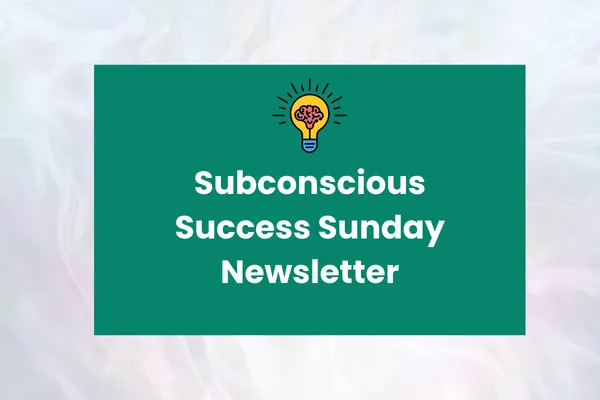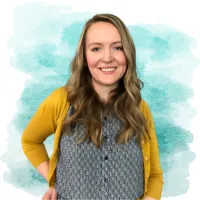Blog
Subconscious Success Sunday Newsletter Archive

Issue 61- 06/30/24 - Subconscious Success Sunday Newsletter: The Map Is Not The Territory 🗺🌎
🧡 Want to share this newsletter with a friend or loved one? Direct them to this link so they can sign up too! 🧡
Audio Version:
Text version:
Quote of the Week
"There are things known and there are things unknown, and in between are the doors of perception."
-Aldous Huxley (Author of "Brave New World")🌼
A Little "Pre-Reading" Before This Week's Tip
Ever been curious to learn more about how your mind and brain work?
Well, there are a lot of different popular perspectives from traditional clinical psychology and neuroscience, but have you heard about Neuro Linguistic Programming ("NLP")?
Most people I ask this question to shake their head "no"...so, I thought I'd write about it since a lot of the transformational work I do with clients is based the principles or "pre-suppositions" of NLP.
Created in the 1970s by a computer science & psychology nerd + a linguistics & behavior specialist, NLP laid out a somewhat simple structure of human behavior.
In the book "NLP: The New Technology of Achievement" by Steve Andreas and Charles Faulkner, they noted that if they could summarize all the NLP Presuppositions into one phrase, it would be that "humans work perfectly."
To me, this basically means that our behaviors can be mapped out into a structure/system and are mostly predictable.
As a systems and processes nerd, this is pretty damn exciting as it creates a practical way for us to create inner change and expand our ideas of "what's possible" for us and others.
So....
✨ What if we didn't have to be stuck in suffering or struggle?
✨ What if we can do and learn things we previously thought were not possible for us?
✨ What if we don't have to rely solely on force and willpower to change or create new habits...without having to "try hard"?
✨ What if could expand our ideas about what it actually takes to change our minds, emotions, and behaviors (vs. subscribing to the societal narrative that it has to take a long time, isn't possible, requires struggle, etc.)?
If any of these questions interest you...you might really enjoy the next series of newsletters where I'll be sharing more about NLP principles!
Actually...you might really enjoy delving into this inner work for yourself if you haven't yet.
Without further ado, let's dive into today's "NLP Pre-Supposition".
This Week's "Subconscious Success" Tip
Neuro Linguistic Programming Pre-Suppositions #1 & 2:
"The map is not the territory."
& "Everything has a structure."
What do these mean? Let's break them down.
In the first pre-supposition, "the territory" is the world around you, full of events, experiences, and other living beings. It's our external circumstances.🌎
"The map" is your unique way of perceiving the world...shaped by your neurology, beliefs, experiences, and inner filters. 🗺
The way we perceive the world through our "maps" is not how the world really is.
Maps cannot possibly account for all the details and nuances.
Also, while the world around us is rapidly changing, our maps can become outdated and inefficient.
For example, if it's raining outside, one person might perceive that to be dreadful, while another feels that it's calming. The event of the rain itself in the world is neutral.
Or, let's say that a person has an "inner map" about relationships and how people can't be trusted. They likely come across a lot of evidence in their life of why that's true and experience a lot of betrayal.
However, we know that this isn't the experience for every single person. Therefore, it's not 100% true.
Which begs the question, what are the mental maps of those other people, and how do they experience life instead?
This pre-supposition reminds us that it's much easier to update our "mental maps" than to try and change the world.
If you have a "mental map" that every time it rains you feel like crap, wouldn't it be great to at least have a neutral response to it vs. spending future rainy days in dread?
Or what if you didn't have to go down "the same old crappy road" when a certain external circumstance happened? What if there's a "new road" that you haven't checked out yet?
How much more presence, pleasure, and ease would you have in your life if you updated some of your "mental maps" of the world?
Well luckily, these "maps" have structures and patterns to them. So when we change one part of the structure or pattern, it can change the entire experience of it.
You could also take a peek at someone else's "map" that already models qualities you want to embody and apply that structure to your own "map".
How to apply this tip

Let's take a peek at the above example.
On the left, we have a person with an "inner map" that shows opportunities are rare. Therefore, in their experience of life, that usually proves to be true.
Meanwhile, the person on the right has a "mental map" that opportunities are abundant, and therefore experiences a lot more of them.
It seems that there may actually be a lot more opportunities in the world than the person on the left believes there to be, and they might benefit from an update of their inner map (if they're wanting more opportunities, of course).
So, a great way to work with the "map is not the territory" pre-supposition is to catch yourself when making absolute statements that are limiting, and take a moment to ask yourself "is that really true? Are there other people out there that experience this differently?".
And take a moment to think about what the inner maps of those other people might look like.
What beliefs and habits do they have? How do they go about finding opportunities? What is their attitude? Is it always straight forward to find an opportunity, or do they sometimes venture down an unknown path out of curiosity before finding one?
These kinds of questions will also begin to unveil a structure for their behavior and how they are "being", which you could then apply in your own life.
Why this works (the short version):
This blog is already way longer than originally intended (I felt inspired 😆)...but I'll share 1 quick thing.
Our brain filters our experience of the world through the Reticular Activating System ("RAS"). Science has shown that our senses gather about 11 million bits of data from our environment, of which we can only consciously perceive ~50 bits, more or less.
Really makes you question what "reality" truly is, eh?
Each of us has different sensory filters, so we all have a unique experience of the world around us.
Cool thing is we can adjust our filters by learning to work with our imagination and subconscious, automatic responses...and therefore...have a totally different experience of the world.
Ready to try it?
In the next week, next time something doesn't go the way you want it to...take a moment to imagine your experience of this as a mental map.
Remind yourself: "This is not necessarily how the world truly is 100% of the time. This is my perception of the world, and if I choose to, I can change that perception."
Then ask yourself: "What would an updated mental map of this experience look like?".
From there, you'll have a starting place from where you can dive deeper. Sometimes just doing the above reflection can create amazing change.
That's it! Have questions about this week's tip? Want to share something with me? Connect with me!
.
Cheers to your success!
-Alina Nikishina
Transformational Coach & Mentor
P.S. Want support with updating your mental "maps" so that you can experience more ease and opportunities? Book a Core Transformation session with me! This gentle, structured process can help you create inner change without struggle or having to force anything.
Interested? Book a discovery call here. I also invite you to connect with me via e-mail or Instagram - click here for that info.
P.P.S. Did you stumble upon this blog and want to sign up for my newsletter so you get a fresh one into your inbox each week? Click here.
Terms & Conditions | Privacy Policy | Disclaimer Policy
Copyright © 2025 Insightful Advisers LLC dba Alina Nikishina

